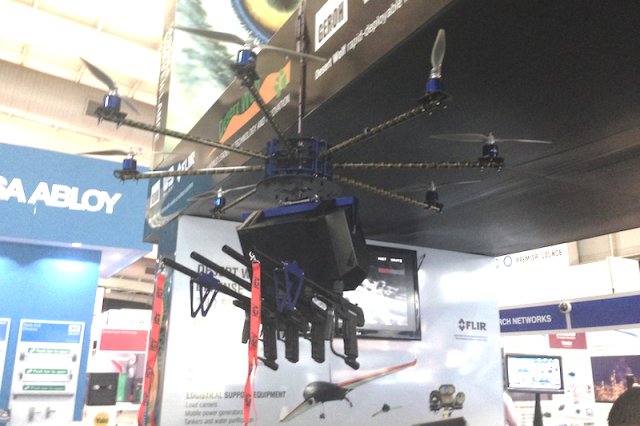Specialist surveillance company Desert Wolf is seeking to establish manufacturing facilities that can build at least a thousand Skunk unmanned aerial vehicles (UAVs) a month, in response to massive demand for the riot control vehicle, which is being developed into a whole family that can be used for a variety of duties, such as search and rescue, surveillance, LIDAR scanning and lifeguard.
The Skunk octocopter, armed with four paintball markers, cameras and a loudhailer, was unveiled at the IFSEC security exhibition in Johannesburg in May this year, where it generated a considerable amount of interest both locally and abroad. Hennie Kieser, Director of Desert Wolf, initially planned to produce several hundred a year at most but the market demand for the aircraft is over a thousand a month.
The company is also re-designing the aircraft with various improvements and will offer it for a variety of duties – Kieser said that the riot control model was “just the beginning” in a planned series. Various mission envisioned for the Skunk include acting as a lifeguard that is able to drop a life raft to someone in trouble. Another variant for disaster relief would be able to carry and drop 30 kg of supplies – the United Nations has expressed interest in such a variant. Other missions could include delivering medical supplies and one option could be to mount weapons, such as the Neopup low recoil 20 mm cannon.
The new range will be marketed at the Africa Aerospace and Defence (AAD) 2014 exhibition this week. The new Skunk II is bigger and better and constructed with enclosed rotors with extended air time of up to six hours.
Desert Wolf is currently producing the Skunk II in South Africa with a maximum capacity of 50 units per month. Desert Wolf will only start selling the next generation Skunks as soon as it can establish production facilities. The original idea was to build the UAVs in South Africa at the rate of ten to thirty a month but because of the massive demand, a foreign partner had to be found.
Desert Wolf is seeking capital investment of $200 million to produce thousands a month and is looking to establish a production facility in Malta, which will be set up for manufacture in March next year. Training UAV operators will also take place in Malta as Malta is encouraging such business development.
Desert Wolf is not selling its UAVs in South Africa because of the SACAA ruling that UAVs are illegal and is doing demonstrations outside the country. The company is still exhibiting and marketing its products though.
In South Africa, Desert Wolf has had enquiries from metro police for service delivery protests. Mining companies are also very interested – for example Lonmin wants to be the first customer once UAVs are legal again in South Africa. “There’s a huge demand just for the Skunk system in South Africa,” Kieser said.
A customer in the United Arab Emirates if very interested and is looking to order an initial hundred, then four hundred then five hundred. Interest has come from places like Turkey (police), Europe, then North East Africa and the United Arab Emirates region. Algeria and Nigeria are serious about buying the drone, particularly due to unrest in Nigeria.

